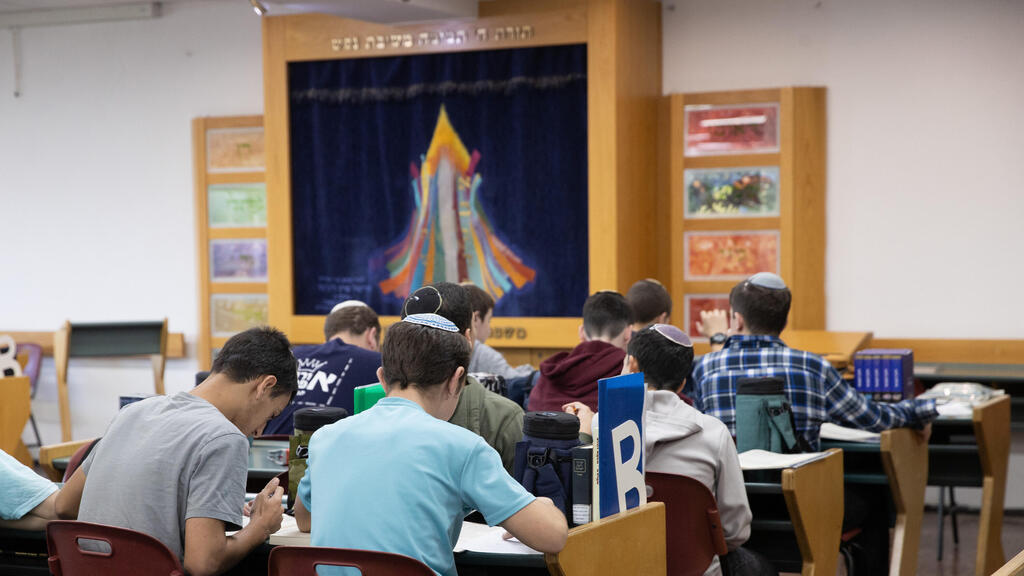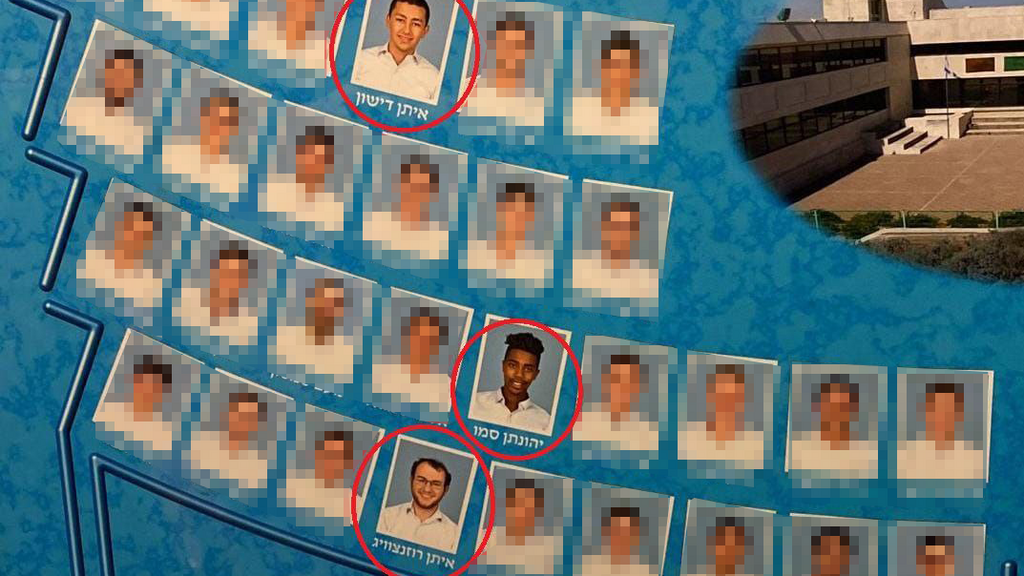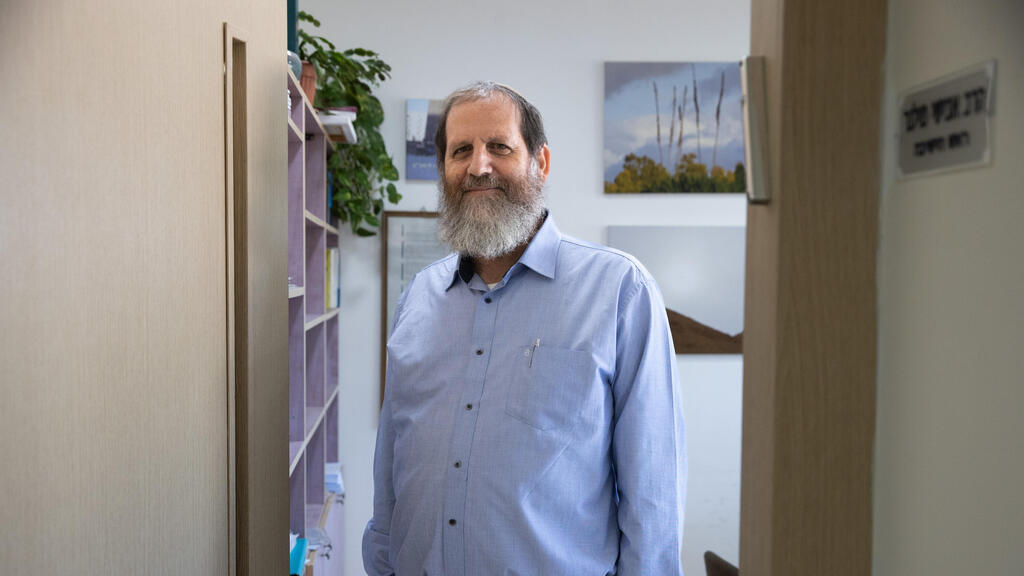Since the outbreak of the Gaza war, tragedy has haunted the Ohr Torah Stone network's Neveh Shmuel yeshiva high school in Efrat. Seven of the school's graduates have been killed since the murderous terrorist attack by Hamas began, and others among the fallen are family members of students currently studying at the religious-Zionist educational institution.
More stories:
"I am not surprised by the quality and dedication of this generation," says the head of the yeshiva, Rabbi Avishai Milner, of the young soldiers, in an interview at his office at the yeshiva, located 20 minutes from Jerusalem. "There was a lot of talk about Tik Tok and the digital screens, but I keep saying that they are amazing, wonderful and much better than our generation. You see it especially now during the war, but it was this way beforehand too."
"This is the generation of screens and Tik Tok, that's true, and it's not that there are no implications to that reality - but it's also a generation that volunteers and performs acts of kindness 10 times more than my generation," says Milner, a resident of nearby Alon Shvut. "They are busy giving and doing, and they have higher human sensitivity than we had. It amazes and moves me to witness their mobilization when they were called to defend the homeland. I am not only referring to the religious Zionist youth or to Neveh Shmuel alumni in particular, but to the entire generation. Graduates of secular high schools have also fallen, and I don't like keeping count."
On the wall of Milner's office hangs a copy of the Declaration of Independence next to a photo of Rabbi Avraham Yitzhak HaCohen Kook and a copy of the famous painting by Maurycy Gottlieb, "Jews Praying in the Synagogue on Yom Kippur." In keeping with tradition of prestigious high school yeshivot, Neveh Shmuel combines high-level Jewish studies with academic high school classes and has a very high rate of matriculation.
Shay Pizem, 23 years old from Ein Hanetziv, fell in battle in the southern Gaza Strip less than a month after the birth of his daughter, Yarden Ori, and was the seventh graduate of Neveh Shmuel to be killed since the outbreak of war.
5 View gallery
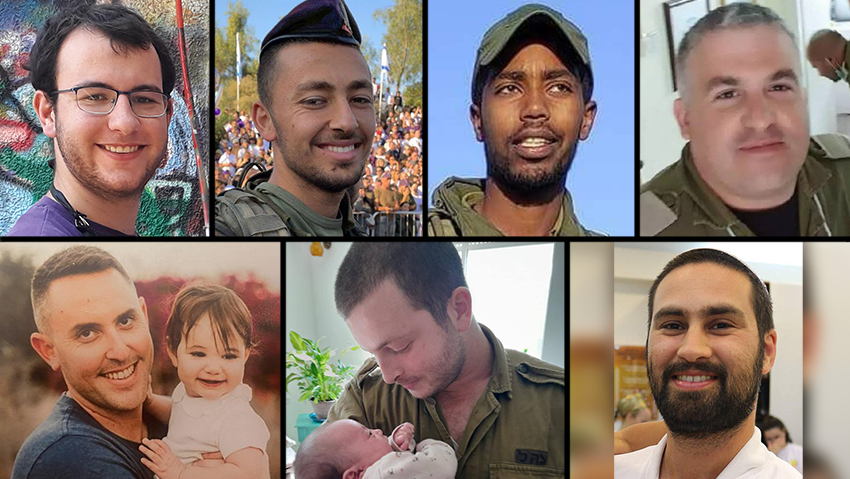

(Top row) Sgt. Eitan Dov Rosenzweig, Sgt. Eitan Dishon, Sgt. Yehonatan Yitzhak Samo, Capt. Elhanan Kalmanson; (botton row) Sgt. Maj. Gideon Ilani, Shay Pizem, Itai Zafrani
(Photo: Na'ama Paz, IDF, courtesy of families)
He was preceded by Capt. Elhanan Kalmanson, who fell at the beginning of the war after long hours of heroically rescuing people from the inferno in Kibbutz Be'eri; and the soldiers Sgt. Yehonatan Yitzhak Samo, Sgt. Eitan Dishon, Sgt. Eitan Dov Rosenzweig and Sgt. Maj. Gideon Ilani, who fell in battles in the Gaza Strip. Rosenzweig and Ilani continued after graduating from the high school yeshiva to study at the Yerucham hesder yeshiva, which also lost seven of its students and graduates in the war. Along with those who fell in combat, Itai Zafrani, who attended Neveh Shmuel for one year in the 9th grade, was murdered at the Nova party near Re'im.
They all have their individual stories, ages, marital statuses and places of residence, but they all have that one thing in common - they all studied there. "We are in closer contact with the families of the younger fallen, also because two of them - Dishon and Rosenzweig - have younger brothers studying here today and naturally that involves the yeshiva more," says Milner. In addition to the fallen graduates, fathers of two current students were killed in combat: Dr. Eitan Naaman, the doctor from Soroka killed at the beginning of the war, is the father of Avinoam, now studying in Neveh Shmuel; and Yossi Hershkowitz, principal of Ort Pelech boys' high school who was killed in the Gaza Strip is the father of Be'eri. who is studying in the yeshiva.
Matanya Gantek, Pizem's classmate (class of 2018), works today as a counselor in the yeshiva. "When I have free time, I'm deep in mourning, and when I'm at work as a yeshiva staff member, I suppress those emotions. I am there for the students, and at this time we need to listen and accommodate I need to be there for them," he shares.
Your friend Shay fell just three weeks after becoming a father
"I spoke to him a bit around the time of [his daughter's] birth. It opened up a new world of parenting emotions for him. We had a friendship and we learned together as a pair until the very beginning of the war. He was a diligent and industrious person, and was able to recall intricacies that we covered three years ago in our in-depth Talmud classes. He was also a counselor, at the new Har Etzion yeshiva high school for boys. Most of my memories of him are funny ones, despite the fact that he was a serious person. He was an idealistic kibbutznik on the one hand and on the other hand focused on learning. He always believed in hard work."
How do you digest the hard news that comes one after the other?
"On a personal level, it's a shock. I haven't digested it yet. On the values level, this is the education at Neveh Shmuel - educating toward excellence, following through to the end, making sacrifices. So, in this respect, it’s not suprising."
Three classmates slain in Gaza
Samo, Dishon and Rosenzweig studied in the same class at Neveh Shmuel. All three were killed in combat in the Gaza Strip last month. "Each of them was a different personality, and each of them had their own clique of friends. It's crazy that it affected the whole class, every group in the class took a hit," says their classmate Tzuri Grombek, from the yeshiva's class of 2020, who today serves in the Givati reconnaissance unit. "In the class WhatsApp group there's a bizarre sequence where a message of mourning with details about the funeral appears followed by a chain of sad messages - and then it happens all over again."
"I was at all three funerals, and I also went to comfort the mourners," he says. "It's too big to digest. With us all living in a wartime we’re almost prevented from it really sinking in. We continue moving forward, when it's clear that at some point the understanding of what happened will really sink in. I studied with Eitan Dishon in the Kiryat Shmona yeshiva [after graduation], and we also enlisted together in Givati reconnaissance. We were very close friends; he accompanied me on my wedding day. He had the ability to combine lightness, an optimistic outlook and peace with clarity of thought, and I could consult him about anything. He was also really funny, and we used to go on outings together. When we were in yeshiva in Kiryat Shmona, every Friday we would go to a nearby stream."
Doron Tzur, another friend from the same class, recalled: "All three of them smiled a lot, and there is another point that all three of them have in common in my opinion. Many times people don't live their lives to the fullest and act in accordance with what is expected of them - but I think that Dishon, Rosenzweig, and Samo all went their own way. Dishon was a genius, he understood everything. With Rosenzweig, you saw it in his art, he broke boundaries. Samo, who was a good friend of mine, lived life %. He understood that you only come this way once, and he didn't care what people said about him."
'The faculty is also heavily shaken "
Two of Milner's children are serving in the reserves. "Our students are intelligent and engaged, and they are experiencing the full gamut of feelings and emotions," he notes. "The fact that among our students are also brothers of the fallen and sons of the fallen brings the tragedy of the war home here in an even deeper manner."
The yeshiva's educational advisor, Yehudit Lederer, says it has been very hard on the school. "We were not prepared for the scope, it is a very difficult situation and we are learning how to process it as we go. We talk to the students about their sorrow and pain, and we allow them to express all of their feelings. We also talk about the long-term view, about resilience and the values that sustain us. I think that a lot of what drives them is the social involvement."
She emphasizes that "the faculty here is also heavily shaken. For me, this is no less a traumatic incident than for the students. I see how the staff gets knocked down, they take a deep breath, pick themselves up - and then again, and again. There is a strong and solid team here, but we are not machines, we are human beings."
When Milner was asked if there's something in the yeshiva's education that pushes students to contribute to society after graduation he replied: "Certainly the education in the yeshiva is a very Zionist and Jewish education, an education rooted in the call 'hineni'- 'here I am' - that if the people of Israel need us, we are here to help. There is a high awareness here of the importance of military service. Almost everyone goes to preparatory schools or hesder yeshivot after the 12th grade, and in the end they all end up serving in significant positions in the army."
However, it is important for him to clarify: "With all due respect to Yeshivat Neveh Shmuel, and there is respect, all of these young men also come from homes and families that brought them up to push forward. I estimate we have a 15% share in their education."
5 View gallery
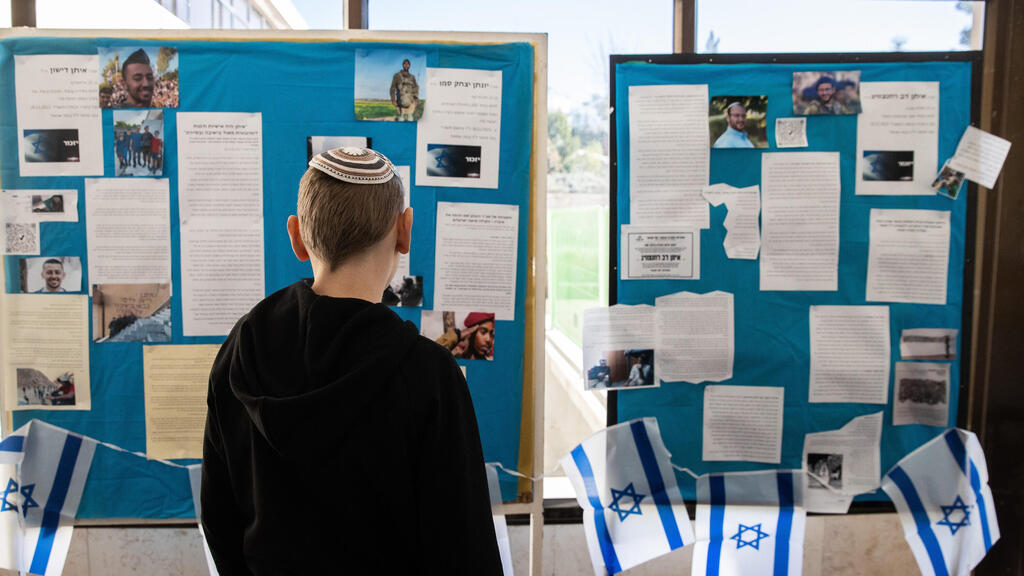

A student at Neveh Shmuel yeshiva high school looks at the memorial wall set up to honor the fallen soldiers
(Photo: Alex Kolomoisky )
Do the students raise questions of faith?
"Questions come up, but I feel that the philosophical questions are less central for them – both now during wartime and in general. I feel that their central question is more existential: the disturbance of their sense of security in life, of the trust in ordinary and simple living, of the belief that everything will be okay. There is apprehension and fear. The simple trust in life has been shattered - and I feel that this is more troubling for this generation. Questions of 'Where was God' or "Why do bad things happen to good people" – these are less present. The existential questions, survival, how to live with insecurity – that is what they are dealing with."
Have guidelines for the students been modified in light of the security situation? Especially considering that the yeshiva is beyond the Green Line.
"Yes. Hitchhiking outside the Efrat community is always prohibited, and no one may go off campus without permission from the dorm. Now we are much stricter about that. There are also additional security instructions from the Ministry of Education, and we have added even greater security measures than required. It costs us a lot of money, but since this a boarding school, they sleep here at night and there is a lot of pressure at this time, we augmented security. "
The war entrenched values
Rabbi Dr. Kenneth Brander, president and head of the Ohr Torah Stone network of institutions, says the network is supporting the staff and students of all of its school. "We are in constant contact with the principals and directors of all our institutions. We support our graduates and bereaved families, and we help in every way possible. With the guidance of a senior psychologist, our principals and administrators, we have established the infrastructure for a formal resilience project to begin in January 2024. We raised a lot of money for this. All of our educational institutions espouse the philosophy that we believe in of not only synthesizing general knowledge and Torah knowledge, but also contributing to the country. Thanks to the heroism of our fighters, we have a strong country. I am very proud of our institutions' male and female students, and all that they do."
According to Milner, the current war "has entrenched many of the values that we discussed in our seminars. People really give their lives. In the first month, we dealt a lot with the war, and now less so. We do try to maintain the infuriating word known as 'routine'. In general, students in the 11th and 12th grades" don't want routine. They want to be active, to be volunteering - in agriculture, in the hotels with evacuees. They feel they 'missed' the war, they want to feel they are contributing and really go out to volunteer a lot."
There is a feeling that the internal political debates that were pushed aside in the first days of the war have recently returned to the center of public discourse. Does that worry you?
"If there is something that worries me, it is mainly the day after the war. Before the war, we were on the edge, in grave danger in terms of hatred and polarization. In my eyes, the great task moving forward is to create a discourse of unity, which thrusts aside the extreme 10% on the right and the extreme 10% on the left, and makes sure that the remaining 80% will work together, talk to each other and lead the country forward."



